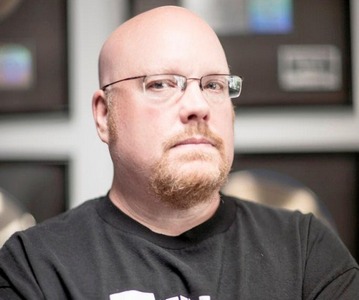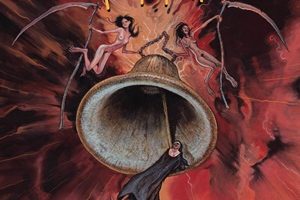Brian Slagel – For the Sake of Heaviness
Sunday, 6th August 2017
Even if, by some odd reason, you don’t recognize the name Brian Slagel, chances are you’ve heard of Metal Blade Records, of which he founded and is the CEO of (you are at a heavy metal website after all). The man has been instrumental in laying the groundwork for the heavy metal/extreme metal scene, and Metal Blade has been the launching point for a number of bands within it (Metallica, Slayer, and Cannibal Corpse, to pick three). More importantly, over the course of 35 years, the label has never wavered in its integrity and devotion to the scene (as we discuss below, “metal” is in the title after all).
So now, Slagel has compiled a book that takes the history of Metal Blade Records over the course of the last 35 years, entitled For the Sake of Heaviness: The History of Metal Blade Records [Pre-order HERE]. Obviously, there’s a wealth of information to consume from its contents, with Slagel’s insights on both the label and changes throughout the scene through the years. With Slagel promoting his book, we took a few minutes of his time to discuss it further, as well as his views on things such as the business side of running a label, the importance of staffing, and living a life of metal.
Dead Rhetoric: In writing the book, did it bring back to the surface any events that you may have forgotten about, either good or bad?
Brian Slagel: Yeah, totally. It was kind of an interesting process going back. Especially to the beginning, trying to remember everything that was going on back then. It was actually pretty cool though. For the most part, everything was positive. Obviously there are parts you have to remember that weren’t so great, but the good part about those things is that we got through them.
Dead Rhetoric: Any bands when you started that you wished that you had signed in retrospect?
Slagel: It’s one of those, “if I only knew then what I know now” sort of vibes. I talk about all this stuff in the book, but I did a bunch of stuff with Motley Crue. Their managers came to me when they had the Too Fast for Love record and said, “We have 900 Motley Crue records, what do we do with them?” I told them a distributor that would help them out. Same thing with Ratt, and even the Metallica situation…if any of us had any money we could have made a record, but none of us had any money so we never made the record with them. It’s all fine – it’s just one of those things….that old cliché, everything happens for a reason. I was just lucky enough to be in the right place at the right time to even have some little piece to do with all of that stuff.
Dead Rhetoric: Obviously you’ve weathered a lot of storms going through the years…could you foresee the changes within the industry coming, such as ‘90s alternative music and the Internet explosion in the 2000s?
Slagel: Yeah, what happened in the ‘90s, you could see that sort of happening. Metal was becoming a joke in and of itself and it needed to go to the underground to kind of reinvent itself. The funny thing about all the grunge stuff, the ‘90s alternative…we did a ton of marketing. We worked with Alice in Chains, Soundgarden, Faith No More, Mother Love Bone, and all these bands back then. All of the guys that were in all those bands were huge metalheads and they were massively influenced by it. A lot of that music was different, but still had a massive metal influence. Of course, back then, none of those bands could ever admit to it [laughs] – it was a dirty word. But you could clearly see it coming and it needed to happen, and it’s a good thing that it happened.
With the early 2000s…you notice these things always happen at the end of decades? Every 10 years there seems to be a dramatic shift with something for some reason. It’s interesting to see that. We try our best to figure out what is going to happen.
Dead Rhetoric: As you were saying, metal at that point [the early ‘90s] needed to go back underground. Do you think it’s better served there at that relative spot? There’s reasonable success today, but certainly not at the level as it was in the past…
Slagel: It’s interesting, I was talking about this a couple weeks ago. The underground scene is still really in a great spot, and metal overall is in a good spot. You’ve got Metallica playing stadiums; I just saw Iron Maiden play two shows in NYC that were sold out. There’s a thriving underground…you’ve got bands like Ghost starting to break through, but it’s definitely not as mainstream as it was before. Certainly not at the levels that it was earlier, but there are some elements of that happening now. The big mainstream stuff is all about pop and hip hop, and that’s what everyone wants to be [in]. People are talking about the death of the guitar gods, and is rock and metal going away? Maybe that’s just right for something interesting to happen in the next couple of years – we’ll see; I hope so.
Dead Rhetoric: As you continued to grow as a label, how important was it to find the right staff to keep things running?
Slagel: That’s of the utmost importance. We are only as good as the people we work with, and the artists we work with. I’m extremely lucky to have always had an amazing staff of people. A lot of them have been there, almost since day one. Mike Faley has been there over 30 years, Tracy Vera has been there for over 30 years…a lot of people that work with us have been there 15-20 years. You can’t run a successful business, let alone label, without a great group of people. I’ve been lucky enough to have had a phenomenal group – it’s really a family at this point.
Dead Rhetoric: It’s funny that you say that, as one of the things I’ve looked at in talking to some of the bands on your label that have been around there a while, such as Cannibal Corpse, Six Feet Under, and The Black Dahlia Murder, is that they say the same thing. How much of a role has mutual respect played, in developing that family relationship?
Slagel: Totally – I think that’s really important. I’m lucky enough that I can call all of these bands that we work with friends, first and foremost. You want to work with people, and the people at the label, we are all really good friends…family is definitely a big part of it. Again, I’ve been so lucky to be able to work with so many amazing artists and be friends with them. I’m still good friends with the Metallica guys, and Slayer…Kerry King is one of my close friends. Over all these years, it’s really awesome that the whole metal community has stayed together and we’ve all stayed friends. That’s an important thing about how to be successful. You want to wake up in the morning and be happy in what you are doing and dealing with the people you are dealing with [laughs]. It makes everything else a lot easier!
Dead Rhetoric: So how does that feeling continue to grow and drive you, 35 years later?
Slagel: I’m still just a huge fan. I’ve always tried to be that way. I mean, I saw Iron Maiden twice this weekend. I’m still a big fan of everything. I’m excited hearing new bands – I think there’s a lot of good, new music coming out now. The scene and industry is in a really interesting time. We are moving to a different format of how people listen to music, but I think that’s a really great thing. More and more people have access to music now than ever before. It’s still a lot of fun and I still love listening to the music and hearing all the new stuff. As long as I can remain a fan, which so far so good, it’ll be fun.
Dead Rhetoric: There’s obviously a financial side to running a label – what are some of the things that you have to consider that the average person may not think about in this regard?
Slagel: Well, that’s definitely the least fun part of the whole thing [laughs]. It is a business, and you have to run it like a business. So every once in a while you have to make difficult decisions on where you spend money, and how you spend money…all that sort of stuff. Again, we have really great people working for us that help with all that. Enough of us know where to go. But it is running a business, and people have to remember that it is the music business. It’s extremely important for the artist too. You need to know how things are going, and what I tell everyone is that we work for the band. They don’t work for us – we work for the band. The same with managers, lawyers, they are all working for you…and not the other way around. I think a lot times bands think, “Oh, we are working for you.” No, no, no – we work for you. You have to be part of the process. Luckily that is a pretty easy way. We are surrounded by really good people, so it makes that part of it a lot easier too.
It took a long time to figure that out, but it’s way more fun to work with people you like and have a good team around you. My analogy is always that a car has four wheels on it. If all four wheels are going in the same direction, you are going to go really fast. When you’ve got the artist, the manager, the label, and the lawyer, and the booking agent all on the same page moving in the same direction, they go real fast. Anytime you get one of them not going in the same direction, it’s going to make things difficult. Right now, for the most part, that’s the way it is. And that’s the way it’s got to be to really be successful. If there’s any artist you heard about, or any band you loved that never got to be as big as you thought they were going to be…90% of the time it’s because they were involved with somebody, one of those elements, that weren’t doing things the right way.
Dead Rhetoric: In looking at your roster over the years…has sticking with metal, with a few exceptions here and there, allowed Metal Blade to keep a more revered status amongst those upper tier labels in the industry?
Slagel: I hope so. This is the kind of music I like. Basically, whatever I like is pretty much what we are going to sign [laughs]. I like a variety of things – I like death metal, but I like Kings X. Whatever it is, I like a lot of different things. I think the fact that we have been able to adapt and go from one genre to the next…we like a lot of things. We try really hard to try to figure out what’s coming next, and again, we’ve been pretty lucky to be able to work with that sort of stuff. We’re never going to sign a country artist, or a hip hop artist, or any of that stuff. It’s not going to happen. We sign what we sign and we are who we are. Luckily, over all these years it’s kept us going.
Dead Rhetoric: Makes it a little tougher too when the name of the label is Metal Blade…
Slagel: Yes, that’s exactly right [laughs]! It’s not as hard as it used to be. Back in the day, when we were signing these punk bands like DRI and Doctor Know…none of them wanted to be on a label that had metal in the name, so we started a subsidiary named Death Records and did that. Now, I don’t think it’s as big an issue, but it still does keep you on your toes.
Dead Rhetoric: There’s a box set that comes with a cassette for the pre-order of the book – how were the bands/tracks chosen?
Slagel: We just kind of wanted to go through the roster over the years and pick some of the seminal bands from the history of the label. It’s always difficult because you can only put a certain number of them on. It makes it a little tough. I think I picked about 25 different things, and then I let a couple other members of the staff pair it down so we could get to where we are at.
Dead Rhetoric: Did you see it as kind of a call back to the Metal Massacre releases in terms of picking them out?
Slagel: Totally! The fact that we put it on cassette made it more crazy! Someone came up with the idea to put it on cassette and as weird as it is I loved the idea. It goes to the history – it’s super fun and we’ve done a few cassette things lately too. There will be playlists on Spotify and Apple Music with all the tracks and stuff there too. We definitely wanted a musical component with the book and thought that putting together a cool compilation of stuff over the history and making a cassette out of it would work.
Pages: 1 2




























